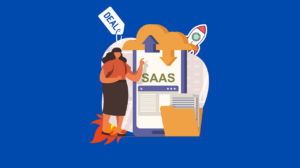Ruby on Rails is a web framework that enables developers to write their code structurally. Through Rails, developers can abstract and simplify the majority of repetitive tasks, making web development easier.
Ruby on Rails is fast for the majority of applications, which is why high-profile organizations the likes of Yellow Pages, Airbnb, Groupon and Gov.uk among others use it. However, of all the available technologies, why would you, a startup, use Ruby on Rails for your project? This article answers this question.
Ruby on Rails Design Philosophy: Write Less, Do More
Ruby is one of the most popular languages. As Tim O’Reilly, founder of O’Reilly Media puts it, Ruby on Rails lowers “barriers of entry to programming” and reduces the development time of powerful applications from “weeks or months to days.”
Building apps using Ruby on Rails is all about writing less code while accomplishing more than developers who use other languages and frameworks. Ruby on Rails places emphasis on efficient code.
Fortune 500 Companies Using Rails
Some of the notable companies whose apps are built on Ruby on Rails include Bloomberg, Netflix, Basecamp, Groupon, Slideshare, Airbnb, GitHub, Fiverr, and Zendesk. Among other things, it’s fast, reliable and supported by a large developer community.

It’s no surprise why Ruby on Rails is the go-to framework for these top companies. Ruby on Rails:
- Is open-source and so are most of its libraries, reducing chances of licensing fees.
- Is great for rapid application development, and making changes is very easy.
- Is built with a focus on test-driven development and has powerful testing frameworks.
8 Reasons Why Rails is Ideal for Startups
Ruby on Rails is Open-Source
Ruby on Rails is registered under the MIT license, making it open-source, and saving you from worrying about licensing fees. However, while most open-source software is plagued by problems such as little documentation and support, Ruby on Rails is an exception to the rule.
Also, Ruby on Rails easily integrates with most of the popular open-source databases and web servers. The result? Faster development, fewer bugs and a low (if any) overall cost of development. All these factors matter in startups where funds and time are limited but critical to success.
Simplicity
Yukihiro “Matz” Matsumoto created the original version of Ruby on Rails with a focus on productivity and simplicity. Ruby on Rails is easy to build on, thanks to its resemblance to the English language. It’s very easy to learn with an adequate amount of effort and time investment.

Ruby on Rails also has a very simple syntax, which compared to other languages, makes building a lot simpler. This reduces the number of problems you face in your start-up’s early days. There will be tons of problems to worry about, and you certainly don’t want the framework’s complexity to be one of those problems.
Ruby on Rails is Fast
As stated earlier, Ruby on Rails is fast for most application categories. However, you’ll come across complaints that Rails apps are not as fast as C or Java apps. As a startup, why would you choose Rails if there are other faster frameworks?
It turns out that what slows Rails apps is bloat. To ensure that your Rails app is as fast as Java or C apps, hire a highly-skilled Rails development team. They will tune the code for maximum performance, and may even build your app under JRuby to make it as fast as Java apps.
Stability and Predictability
Ruby on Rails is a stable framework, saving you from worrying about the validity of your code. You will not face sudden unexpected changes that can endanger the very existence of your startup.
With Rails, it’s very easy for your startup to refactor and extend your app’s code. This makes it easy to add new features to existing code. Rails enjoys well-established coding conventions. If new developers join your startup, they will quickly catch up despite the amount of legacy code.
Easy Maintenance and Change
Another hallmark of Ruby on Rails’ benefits for your startup is that it’s easy to maintain and change implementation. Ruby is built on the principle “don’t repeat yourself” (DRY), which discourages developers from duplicating their code.

Rails also allows developers to encapsulate functionality in small functions or files so that each has a single responsibility. This modularity makes it easier to read, understand and debug code. Code duplication, however, makes code difficult to maintain and more susceptible to bugs.
Scalability
One of the major characteristics of Ruby on Rails is scalability. If your website or app becomes popular, you should be ready to handle the increased traffic and adapt your website to handle those needs.
Out of the box, Rails supports caching and allows you to view fragment caching within the app’s code. You can use Redis as a cache-store. A remote multi-server automation tool like Capistrano helps in continuous integration and continuous deployment.
Chef is a cloud infrastructure framework written in Ruby that helps in dependency management, creation of folder structures and changing system configurations with minimal commands.
Rails is amazing for your startup’s scalability in the way it handles background jobs. For example, when users sign up to your app, Rails enqueues tasks like email confirmations for smooth user experience. Setting up background jobs is simple using Resque or Sidekiq.
Large Talent Pool
Rails has a large community of talented and dedicated developers. These amazing people not only share their work and support each other but also support one another. The result is that it provides great job diversity, many meetups, recruiters, clients, and conferences.

As a startup, you have a large number of investors who are interested in funding startups. Rails is also popular on GitHub, which offers a lot of support for beginners. There are many “gems”, which are software packages containing Ruby apps or libraries.
Security
Ruby on Rails is a mature framework, and one of the benefits of using a mature framework is that it has reasonable security out of the box. Rails version 4 and above has mechanisms to prevent opportunist hackers.
One common way to exploit a web app is through code injection where an attacker introduces malicious code into the application. Rails defends against code injection by:
- Automatically escaping plain strings in your views.
- The sanitize helper removes unwanted HTML tags in the data.
- Allows you to specify the HTML tags you want to allow.
While the framework is not entirely free from vulnerabilities, once the developer community identifies a security vulnerability, it starts working on the solutions. It’s good to know that the safeguards are there, and we can consciously turn them off in a safe way.
How to Choose the Right Ruby on Rails Development Company
Hiring developers is expensive. On average, companies spend $5,134 per hire, and take 95 days to a successful hire. The global software developer recruitment budget is $400 billion. One of the main concerns for a startup is how to hire a great Ruby on Rails consulting service to build applications.
After all, resources like time and money are at a premium. Your ideal team should know how to write clean object-oriented code and how to use tools such as Git, Rspec and their code editor. You also need to check their attitude and soft skills.

You want a team that invests as much time improving their soft skills as they do updating their understanding of new tech trends. You want open-minded, curious and creative people who don’t shy away when exposed to new experiences.
Summary and Conclusion
In summary, Rails is a large mature framework, with many in-built features. Whether you choose to build small or large apps is up to you. Rails is popular because it is standardized, popular and well-established. Its use by large companies like Airbnb and Netflix is a testament to its suitability for startups.
As a startup, you should strongly consider using Ruby on Rails for your application. It is ideal for a tight budget and deadline requirements. It has a huge community and is easy to maintain. Once you choose Rails, you need to find the best Rails development team, to bring your idea to life.




